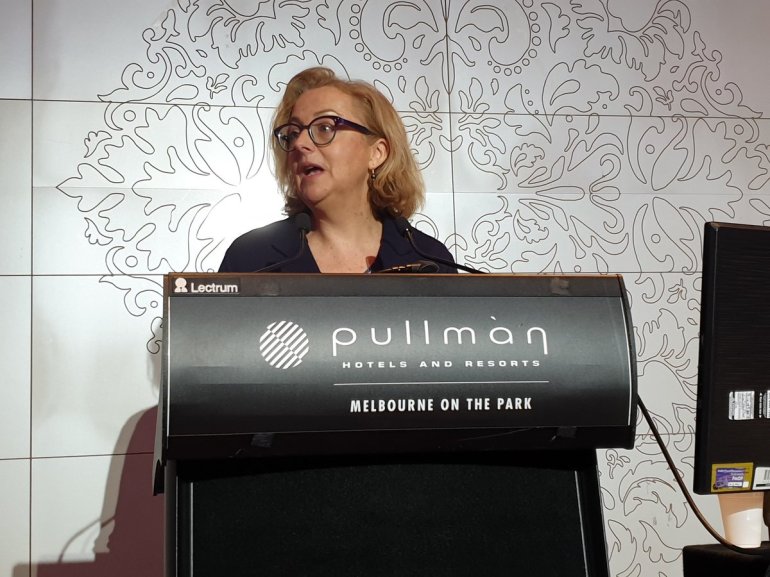Jenny Buckland addresses the ALEA conference
Digital disruption is upending the media industry and creating enormous uncertainty. Audiences are fragmenting and going elsewhere and free to air television is struggling. So it’s relying, more than ever, on live event broadcasting like sport and reality TV contests, and less and less on drama.
This leaves Australian television drama in a very vulnerable position, and Australian children’s drama in an even more vulnerable position.
The children’s drama quota that the commercial broadcasters have to meet is responsible for a nearly 40 year legacy of Australian children’s drama, including programs like Winners, Round The Twist (which was originally commissioned by Channel 7, not the ABC), Spellbinder, Blinky Bill, Lockie Leonard, Mortified and many more.
Right now, the commercial free to air broadcasters are arguing strenuously to the Federal Government, as they have always done, to be relieved of their obligations to the children’s audience.
And right now, they have the strongest case they’ve ever had to make that argument – because they are now competing in a disrupted media environment where viewers have so many more places to go and find content – but they are the only ones that have a requirement to invest in Australian children’s drama.
So, they argue it’s like they’ve got one hand tied behind their backs, whilst Foxtel, Stan, Netflix and the public broadcasters don’t have to screen any Australian children’s content. It’s not a level playing field.
They’re making the case to Government very forcefully that the ABC should be left to do the job.
The problem with that argument is that the ABC is not required to screen Australian children’s drama. Most of the time it does a great job, but some years, especially when its own funding is under pressure, it takes the foot off the pedal and commissions less new Australian children’s content than the commercials are each required to do. And it hasn’t exactly embraced the argument of the commercial broadcasters and used it as an opportunity to argue for more funding for its own children’s content.
Instead it has responded by arguing it doesn’t want to be required to meet minimum levels of Australian children’s content.
The fact that the commercial broadcasters don’t want to do any Australian children’s television, combined with the ABC not wanting to accept a mandate to do more, or even to make the case for greater funding specifically for children’s television, tells us exactly why it’s imperative that the Parliament intervene on behalf of the children’s audience.
The existing regulations are out of date and it’s time for change. But that should mean looking at how we encourage and support Australian children’s content on all the platforms where children are watching – including the public broadcasters, streaming services and maybe even YouTube. It’s time to produce new ways of supporting Australian children’s screen stories, rather than giving up on them.
If we don’t, we’ll ultimately lose Australian children’s drama, with all the opportunity of these wonderful shows to inspire, represent and reflect our culture.
If Australian screen content, especially for children, matters to you, please let someone know. Share its importance, as well as good shows, with your colleagues and family on social media.
Mention that it’s great to have Australian content for kids to watch. There are two hashtags you can use on social media to spread the word – #MakeItAustralian and #SaveKidsTV.
Ideally, though, you could go further. Send your local Federal MP an email or a note, just telling them how important it is to see Australian content, especially for children, on television or catch up or streaming or anywhere else.
And that it’s extremely important we don’t lose this special part of Australian culture through digital disruption. Imagine next week if MPs from all around Australia started getting emails and letters about the value of Australian children’s content. It could be the start of something big.
* Jenny Buckland is CEO of the Australian Children’s Television Foundation. This is an extract of a speech she gave at the Australian Literacy Educators’ Association annual conference.



